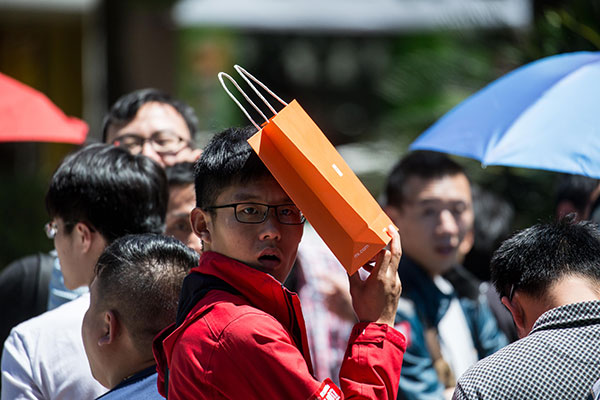 |
|
A customer with a newly purchased Mi Note smartphone in Hangzhou, Zhejiang province. [Xu Kangping / For China Daily] |
Xiaomi Corp, the world's third-largest smartphone maker, is targeting expansion in developed markets after carving a niche for itself in the developing world, as part of its efforts to end reliance on the domestic market.
Wang Xiang, senior vice-president of the five-year-old startup based in Beijing, said Xiaomi is "never afraid of entering developed countries and regions".
"We will cover the surrounding markets first, and then we will enter developed markets after we have gained enough experience and talents," he said during this year's annual China conference held by AmCham Hong Kong on Tuesday.
Xiaomi has "a big ambition to serve all consumers around the world", Wang said, noting the company would need lots of talent in its "going global" process.
Wang's message came after smartphone makers have encountered a rapid slowdown in China - where consumers are buying fewer phones due to market saturation - heightening the urgency for Xiaomi to expand into overseas markets.
Smartphone shipments in China fell for the first time in six years to 98.8 million units, a 4.3 percent year-on-year fall, in the first quarter of the year, according to a report released by market intelligence firm International Data Corporation.
China's overall mobile phone shipments during the period were 109.8 million units, a 5.6 percent fall over the previous year, according to the report.
"Considering that the Chinese market is growing at a slower pace, Xiaomi needs to rely on foreign markets," said Jessie Ding, a research analyst at global technology market analyst firm Canalys.
She said about 90 percent of Xiaomi's total shipments are going to the Chinese market.
"Emerging markets including Africa offer promise," Ding said.
Recent media reports said that Xiaomi has appointed a distributor to sell its smartphones in sub-Saharan African countries.
Xiaomi also announced earlier last month that it was selling and manufacturing a low-end device in India. It was also the company's first overseas production program.
Commenting on the company's plan to enter the developed markets, Ding said intellectual property would be one of "the most important concerns".
The company has already encountered intellectual property hurdles in India, where a patent infringement complaint from telecom equipment giant Ericsson AB briefly halted sales of its handsets late last year.
Apple Inc's design chief Jonathan Ive has said that Xiaomi's designs amounted to "theft".
Lauding Apple as "respectable", Wang said the accusations about Xiaomi's patent infringement are "incorrect".
"Xiaomi attaches huge importance to intellectual property and is investing on it," he said, noting the company files "a surprising number of patents applications" each year.
"It will be around 2,000 or 3,000 (applications) this year. It's a process of accumulation," Wang said.
Contact the writers at [email protected] and [email protected]
